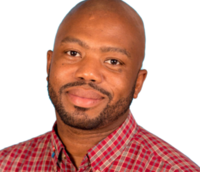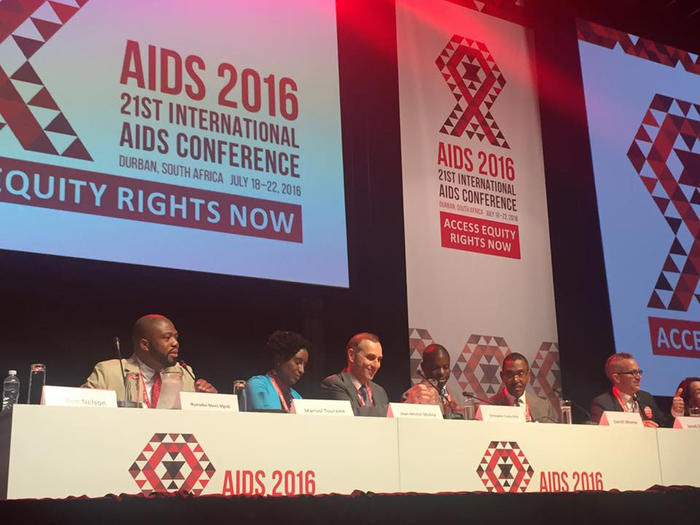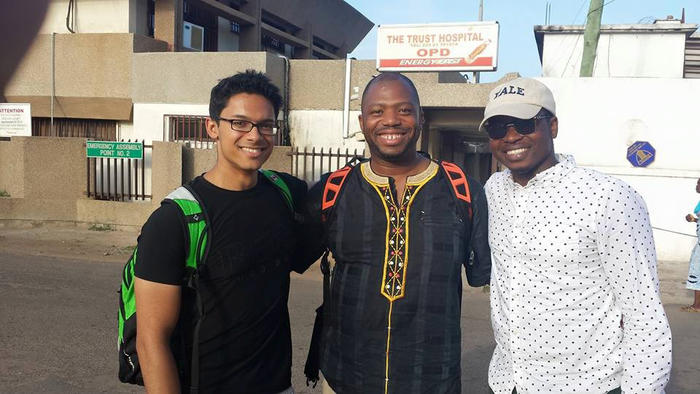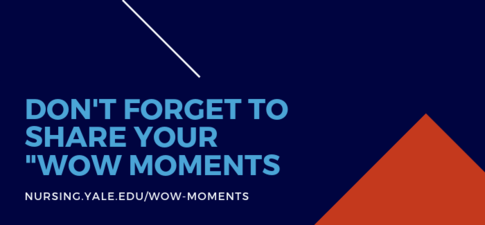 Dr. LaRon E. Nelson, PhD, RN, FNP, FNAP, FAAN arrived at YSN in early 2019 as the Inaugural Associate Dean for Global Health & Equity. He earned his doctorate from the University of Rochester, where he also served as the Dean’s Endowed Fellow in Health Disparities and Associate Director of International Research in the Center for AIDS Research. Dr. Nelson is a leading expert in implementation science and HIV prevention within African and African diaspora communities.
Dr. LaRon E. Nelson, PhD, RN, FNP, FNAP, FAAN arrived at YSN in early 2019 as the Inaugural Associate Dean for Global Health & Equity. He earned his doctorate from the University of Rochester, where he also served as the Dean’s Endowed Fellow in Health Disparities and Associate Director of International Research in the Center for AIDS Research. Dr. Nelson is a leading expert in implementation science and HIV prevention within African and African diaspora communities.
YNM: Tell us about your nursing journey. How did it begin? Do you have other nurses or health care professionals in your family? What inspired you to become a nurse?
Dr. Nelson: My journey to nursing started when I was serving in the US Navy aboard the aircraft carrier USS John F. Kennedy. I didn’t have dreams of being a nurse, but I took a career placement test that indicated that nursing was the best fit for me. In a sense, my path to nursing came by way of “following orders.” I applied for a nursing scholarship and was accepted. I spent a year at Naval Station Newport in a program designed to help us transition from military to civilian college life. When I started my first nursing education program at the University of Rochester, I realized that nursing really was exactly where I was meant to be.
YNM: What makes you the most excited about coming to the Yale School of Nursing?
Dr. Nelson: I am most excited about the opportunity to work with the students to enhance their education with global health experiences and perspectives and expose them to ways of deploying their clinical practice that advance social justice in all the communities they serve.
YNM: Let’s explore your research for a moment. How did you decide to concentrate on global health? What is next on the agenda for your research?
Dr. Nelson: My work is focusing on implementation science. We are fortunate to have a toolkit of interventions and products that together can help prevent new infections and prolong life among people who are living with HIV. A major challenge that I am working to address is how to optimize these tools to generate the greatest impact, specifically within communities of African people whether they are in Ghana or in communities of African-descendants in the Americas.
For example, I developed an intervention model that is designed to help support healthcare engagement and continuity for individuals with stigmatized identities. The model is called client-centered care coordination (C4), and I am using it as an evidence-based tool to help improve HIV prevention and treatment outcomes among black men who have sex with men (MSM), who are a high-priority population for domestic HIV prevention. It is based on self-determination theory and has two components. One component is an approach to engaging with patients in ways that support their autonomy, facilitate their ability to master their health-related goals, and demonstrate emotional connectedness.
The second component is a web-app based platform that facilitatescare continuity via an online platform that allows real-time care coordination among geographically bounded networks of agencies providing services to support the needs of black men who have sex with men (MSM).I was part of team that investigated if this model was associated with uptake and adherence of HIV pre-exposure prophylaxis in black MSM. My next step is to study the implementation of the model in MSM? communities in the United States and Canada. I am also developing a study to assess the effectiveness of the model for reducing HIV viral load and symptom distress among MSM in Ghana. In addition to those projects, I am working on the next generation of the C4 intervention, which will include several enhancements such as symptom monitoring, peer-support, and decision-support. The updated version will be known as C5. I am very excited about deploying this intervention across the country to help accelerate the impact of HIV (pre-exposure prophylaxis)PrEP and HIV treatment on HIV epidemics here and abroad.
YNM: Part of your YSN portfolio is the Office of Diversity, Equity, and Inclusion (DEI). Are there specific projects you look forward to starting or developing? What events are on the horizon for this year?
Dr. Nelson: I will be expanding the Office of DEI, including recruiting a director to lead the office and developing an action plan for how we will enhance DEI at YSN. In the short time that I have been here, I have received volumes of feedback from students, staff, and faculty about how to demonstrate excellence in DEI. I am diving into that feedback and working with Dean Ann Kurth and her leadership team on putting some of those ideas into action. We will have ongoing programming in the school that celebrates diversity and promotes equity and social justice. These will be opportunities for us to show that we appreciate the various ways that we are different and how these strengthen our common goal as nurses to ensure better health for all people.
YNM: You are currently in the process of assembling a new group called Inclusion, Diversity, Equity Action Solutions (IDEAS). Can you tell us a little bit more about the IDEAS council, and what goals you have for this team?
Dr. Nelson: The IDEAS council is the hub for all YSN matters that deal with diversity, equity, and inclusion. It is a model in which representatives of various stakeholder groups within the YSN (students, staff, alumni, and faculty) come together to develop, implement, and evaluate an action strategy for demonstrating excellence in DEI. The IDEAS council members are champions for DEI within the school, accountable delegates who represent the interests of their constituents, and conduits for relaying information to me regarding DEI in the school. I have been “shopping” the notion of the council around to various groups in the school, and everyone I spoke to was very excited. I am super excited.

YNM: If we talk again a year from now, celebrating a success you are really proud of, what does that look like and feel like?
Dr. Nelson: When I arrived at YSN one of the first things I did was to review a survey that was initiated and self-administered by students. The survey highlighted some areas where we can improve with regard to YSN being a place where all students feel like welcomed and valued members of our community. Because the survey was developed by the students, it included the items that they deemed most important. I would love to re-examine those same questions a year from now and be able to say that we made dramatic improvements. To me, it would represent a major success if students reported that we improved on the list of metrics that they deemed most essential to their social experience within our academic community.
YNM: When you think back over your career up to this point, is there a “Wow!” moment that stands out for you?
Dr. Nelson: For me, the “wow” moment was realizing that while my work in Ghana was generating evidence that would help contribute to solutions to the HIV epidemic there, a main benefit was that I was gaining knowledge from the Ghanaian community that was informing my approach to developing interventions in the United States and Canada. I have heard this called “South-to-North” innovation—that is, solutions that are grounded in epistemologies and lifeways of the global south can help address problems that are still perplexing the global north.
YNM: The latest Gallup poll ranks nurses as the most trusted profession for the 17th consecutive year. What are the qualities of nurses that inspire such trust?
Dr. Nelson: I believe that nurses are trusted because of the ways that we connect with the patients and communities that we serve. The deep human connection that we make is required to generate the type of trust necessary for patients to entrust their bodies to us so that we may deliver care to themduring times when their bodies are under duress or are performing (or not performing) in unfamiliar ways that create alienation. Nurses are there with them during these times of vulnerability, confusion and fear. Nurses also advocate for the patients’ interests, even sometimes when those interests are at odds with the interests of the medical team, the healthcare institution or the third-party payor. Patients don’t forget this and neither do their families, friends, students, neighbors, roommates, and their spiritual community.
YNM: What do you think are two of the top challenges facing nurses in 2019?
Dr. Nelson: One top challenge is for nurses to determine how to innovate their practice in response to a world that is increasingly mobile and virtual. While nurses are expert at adopting and integrating new technologies, we must position ourselves as the drivers and designers of e-health solutions. The other top challenge is to accelerate progress toward expanding the coverage of advanced practice nursing models in parts of the country—and the world—experiencing the greatest health disparities and premature mortality. The challenges to be addressed are primarily political; therefore, the solutions will also be political and achieved through leadership, advocacy, and policy interventions.
YNM: Let’s switch gears for a moment. What piece of pop culture do you think depicts nursing the most accurately?
Dr. Nelson: There was an episode of the FX series Pose (Season 1, episode 6 “Love is the Message”) that featured a nurse who was in-charge and a bit hard-nosed. The role was played by Sandra Bernhard. She was protective of the patient. She was attentive and alert to the patient’s condition with a seriousness and urgency of a sentinel. Nevertheless, she was connected. She was with the patient in more than a physical, terrestrial sense… but rather she was linked to the patient in a way that I would describe as cosmic, yet occupational. By this I mean that establishing the connection was a part of the job. Maintaining that connection was a form of labor that the nurse performed. It was physically and emotionally exhausting. It was high-stakes. That to me depicted the real human experience of nursing. I have not otherwise seen good examples.
YNM: What is one piece of advice you would like to share with people who are considering nursing as a profession?
Dr. Nelson: Nursing is a challenging profession that requires intellectual and emotional sophistication. It is not for the faint of heart. I encourage anyone considering nursing to please read The Complexities of Care: Nursing Reconsidered (The Culture and Politics of Health Care Work by Sioban Nelson and Suzanne Gordon. The concluding chapter is titled “Nurses wanted: sentimental men and women need not apply.”


